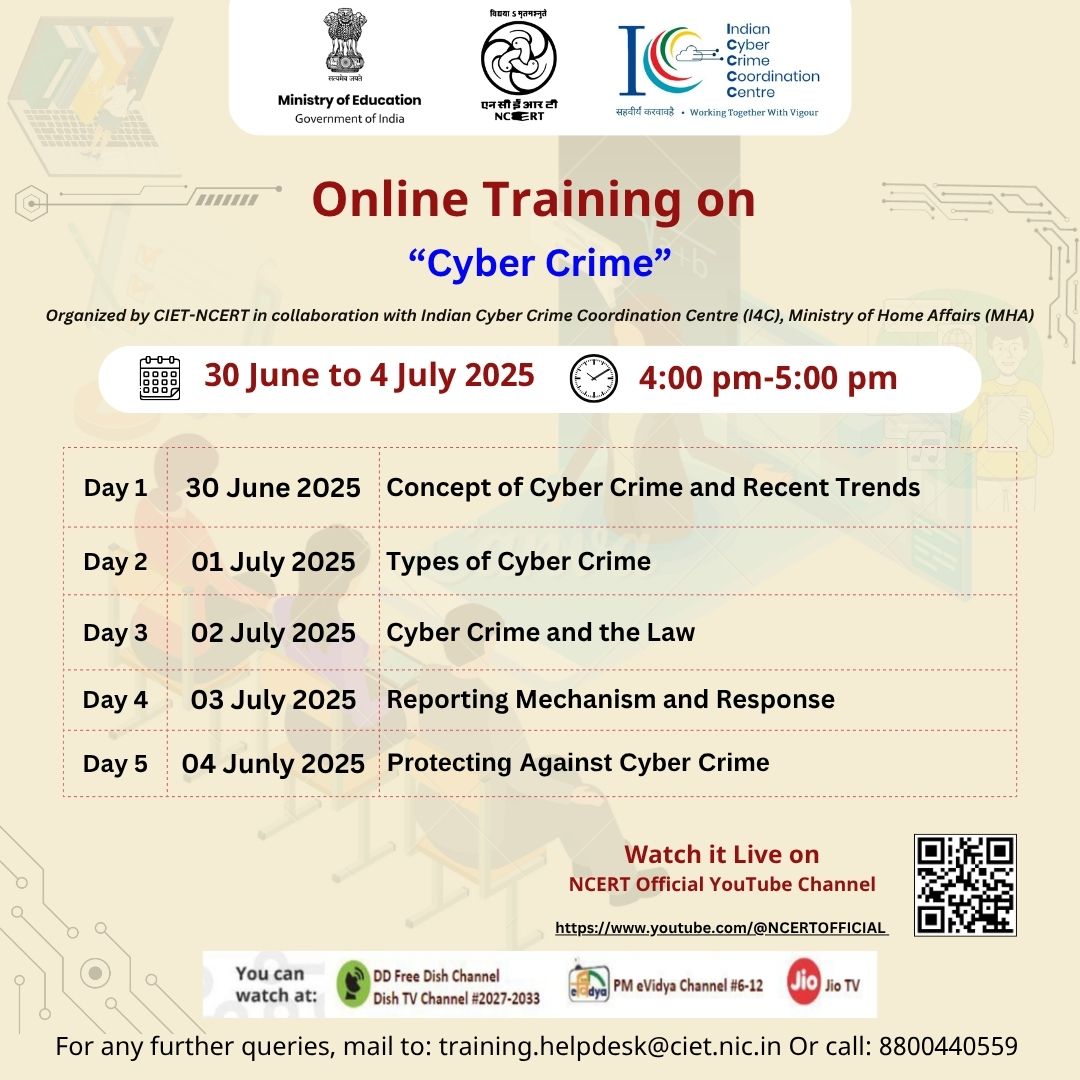
Five-Hour Online Training on
“Cyber Crime”
The rapid expansion of digital technologies has brought about remarkable advancements in communication,
governance, and economic development. However, this progress has also given rise to complex challenges in
the form of cyber crime, which continues to evolve in sophistication and scale. A comprehensive
understanding of the concept and emerging trends in this domain is essential for fostering a secure and
resilient digital ecosystem. Such awareness enables individuals and institutions to remain vigilant and to
anticipate potential threats effectively.
Cyber crime manifests in diverse and increasingly complex forms, targeting individuals, organizations, and
critical infrastructure alike. These offenses may include financial fraud, identity theft, cyber stalking,
ransomware attacks, and various other malicious activities designed to exploit digital vulnerabilities.
Developing a nuanced understanding of these types of cyber crime is imperative for recognizing risk factors,
adopting preventive measures, and building overall digital resilience within communities.
An informed approach to addressing cyber crime necessitates familiarity with the legal and regulatory
frameworks designed to combat such offenses. Knowledge of relevant statutes, such as the Information
Technology Act and provisions within the Indian Penal Code, empowers individuals to navigate the legal
landscape confidently. Furthermore, understanding the legal implications of cyber misconduct reinforces the
importance of ethical behavior in the digital space and strengthens collective efforts toward creating a
secure online environment.
In addition to prevention, the capacity to respond effectively to cyber incidents is of paramount
importance. Timely reporting mechanisms and structured response protocols play a critical role in minimizing
harm and facilitating appropriate legal action. Familiarity with official reporting platforms and the
processes involved in seeking assistance from law enforcement agencies enhances individual and institutional
readiness to address cyber threats promptly and systematically.
Sustained efforts to protect against cyber crime require the adoption of proactive security measures and
continuous capacity building. Emphasizing digital hygiene, safe browsing practices, strong authentication
methods, and regular system updates significantly reduces the likelihood of compromise. By cultivating a
culture of cyber awareness and responsibility, stakeholders can collectively contribute to a safer digital
environment, supporting national and global efforts to counter cyber crime effectively.
To address these evolving dimensions, CIET-NCERT is organising a five-day online training programme titled
“Cyber Crime.” This initiative brings together experts from across the country to deliberate upon essential
issues pertaining to the conceptual understanding of cyber crime, typologies of offenses, legal
perspectives, mechanisms for reporting and response, as well as preventive and protective strategies. The
programme aspires to cultivate responsible digital behavior, enhance individual and institutional
preparedness, and strengthen collective resilience against emerging cyber threats.
The training will be conducted in two versions: the English version from 30ᵗʰ June to 4ᵗʰ July 2025, and the
Hindi version from 7ᵗʰ to 11ᵗʰ July 2025, with sessions scheduled daily from 4:00 PM to 5:00 PM. All
sessions will be broadcast live from the CIET-NCERT studio through NCERT’s official YouTube channel, PM
eVIDYA DTH TV Channels (6 to 12), and the Jio TV mobile application. Furthermore, recordings of each session
will be made available in a dedicated playlist to facilitate continued access and enable participants to
revisit the content at their convenience.
Objectives of Training:
After completion of the training series, the learner will be able to:
- Understand the concept and trends of cyber crime.
- Identify different types of cyber crimes.
- Learn about legal frameworks related to cyber safety.
- Know how to report and respond to cyber incidents.
- Adopt preventive measures to stay safe online.
Program Schedule:
| Date & Time | Title of the Sessions | Name of the Resource Persons | Banner Link | Presentation link | Video Link |
|---|---|---|---|---|---|
|
Day 1: Monday, 30 June 2025 |
Concept of Cyber Crime and Recent Trends | Dr. Deepak Kumar, Sr Technical Program Manager, Indian Cyber Crime Coordination Centre (I4C), Ministry of Home Affairs (МНА), New Delhi | Day 1 | Presentation-1 | Video |
|
Day 2: Tuesday, 01 July 2025 |
Types of Cyber Crime | Mr. Amit Kumar Giri, Data Analyst, Indian Cyber Crime Coordination Centre (I4C), Ministry of Home Affairs (МНА), New Delhi | Day 2 | Presentation-2 | Video |
|
Day 3: wednesday, 02 July 2025 |
Cyber Crime and the Law | Mr. Lovish Seth, Legal Assistant, Indian Cyber Crime Coordination Centre (I4C), Ministry of Home Affairs (МНА), New Delhi | Day 3 | Presentation-3 | Video |
|
Day 4: Thursday, 03 July 2025 |
Reporting Mechanism and Response | Sh. Saddam Ansari, Technical Assistant Indian Cyber Crime Coordination Centre (I4C), Ministry of Home Affairs (МНА), New Delhi | Day 4 | Presentation-4 | Video |
|
Day 5: Friday, 04 July 2025 |
Protecting Against Cyber Crime | Shri Amit Sankholia, Deputy Director, Indian Cyber Crime Coordination Centre (I4C), Ministry of Home Affairs (МНА), New Delhi | Day 5 | Presentation-5 | Video |
|
Organising Team: Programme Advisory: Programme Advisory: Prof. Indu Kumar, Head- DICT, Central Institute of Educational Technology (CIET), NCERT, New Delhi. Programme Coordinator and Course Coordinator : Dr. Angel Rathnabai, Associate Professor, Central Institute of Educational Technology (CIET), NCERT, New Delhi. Technical Coordinator: Mr. Gurjeet Singh, Senior Research Associate, Central Institute of Educational Technology (CIET), NCERT, New Delhi. |
|||||
How to participate?
Step 1 : Registration :
Participants need to register using the following link or the QR code -
https://docs.google.com/forms/d/e/1FAIpQLSekmRMa05pu74IIt-ZvTMYH8c6YzERd3nA6ZO4BYEZBVFE33w/viewform?usp=dialog
or scan the QR code -
Step 2 : Watch live sessions and learn about the topic :
Participants have to attend
training sessions, which will be live-streamed on NCERT Official
YouTube channel - http://youtube.com/ncertofficial from 30th June
to 4th July 2025
4.00 pm - 5.00 pm. Monday to
Friday
The session will also be telecasted live on the following :
- PM eVIDYA Channels #6-12
- DD Free Dish Channel
- DISH TV Channel #2027-2033
- Jio TV mobile app
If anyone has missed the live sessions, they can watch the recording using the playlist link: https://youtube.com/playlist?list=PLcsj1x9n9h4gya2bRLNSdKxfX2-E1f7KB&si=hJ5IsF2ZjuI3tcFm
Step 3 : Take up the online course, participate in post-assessment, and get certified :
Those who are interested in getting a certificate, they need to do the following:
- Join the online course that will be launched on DIKSHA portal Course link :https://learning.diksha.gov.in/diksha/course.php?id=756§ion=1708।
This course will be open till 15 March, 2026. - Participants need to join the course, go through all the five videos.
- Participants need to take up the final assessment. Participants can attempt thrice the assessment.
- Participants who score 70% and above in the final assessment will get a certificate and they can access their certificate in their DIKSHA profile page itself. It may take 15-20 days to receive the certificate.
Step 4 : Submit Feedback : Participants are expected to submit feedback using the link or QR code
-
https://docs.google.com/forms/d/e/1FAIpQLSdGdMymeXeC0UTTqGK_9C96EkECz9fawmJL_biTaLu2gq9vug/viewform?usp=dialog
or scan the QR code-
This feedback form is intended to know participants' experiences, learning, and suggestions regarding the online training. This will help us in further improvement of the virtual training process.
For any queries, mail to : training.helpdesk@ciet.nic.in or call: 8800440559.


